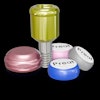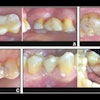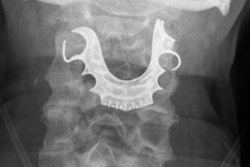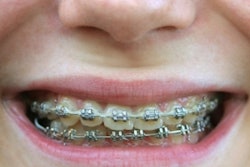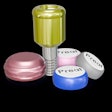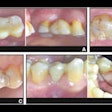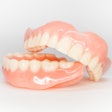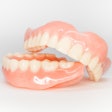
What's in the denture fixative your patients use? Are they using it excessively? And could it lead to long-term health issues?
For one 62-year-old patient in the U.K., the long-term use of a fixative with zinc caused him to lose feeling in both of his legs. Ultimately, he was diagnosed with a rare neurological disorder that he still has not completely recovered from, according to a new case report published online in BMJ Case Reports (August 7, 2017).
"Withholding the zinc-containing dental fixative and short-term copper replacement resulted in prompt normalization of zinc and copper levels and hemoglobin concentration," the authors wrote.
The lead author was Liam Stuart Carroll, PhD, from the department of neurology at the Institute of Neurological Sciences at Queen Elizabeth University Hospital in Glasgow.
Problems with excess zinc
Excess zinc intake can interfere with copper absorption and lead to neurological problems, the according to the author. In rare cases, it can lead to copper deficiency myelopathy, which is a neurological disorder that causes a patient to lose feeling and have numbness in the arms and legs. This condition has a high morbidity, so prompt recognition and management of patients affected by the condition is important. Clinicians should be mindful of risk factors for copper deficiency, including routine use of zinc-containing products.
The patient had been referred to a neurology clinic after developing numbness, pain, and weakness in his legs for more than six months. An MRI scan showed spinal cord abnormalities. After noting that the patient had been a lifelong tobacco user and wore dentures, clinicians asked about his denture use. The patient reported irregular use of two to four tubes of a denture fixative (Fixodent, Procter & Gamble) containing about 17 mg/g of zinc every week for 15 years because of ill-fitting dentures.
Instructions on the packet stated that the product was only to be used once a day and to a maximum of 1.25 g per day. Accordingly, each tube should last about a month. The packaging also stated that if there were problems with ill-fitting dentures, the patient should consult a practitioner for assistance.
The patient was diagnosed with copper deficiency myelopathy after several tests. The patient had exceeded recommended use of the fixative by between four and eight times, the authors estimated.
No full recovery
At publication, the patient had not recovered completely after discontinuing use of the fixative and taking copper supplements to treat his symptoms. He did report a gradual reduction in the sensation of tingling and numbness and subjective improvement of joint-position sense.
The patient has been undergoing intensive goal-directed therapy to enable him to walk with aids, though the patient remains largely a wheelchair user. Physical and occupational therapy continues, along with neurology follow-up, according to the authors.
A delayed diagnosis of copper deficiency myelopathy can lead to permanent nerve damage, they concluded.
"Prompt recognition and treatment of copper deficiency myelopathy prevents progressive and likely irreversible neurological dysfunction," the authors wrote.
